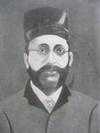Pherozeshah Mehta
.jpg)
Sir Pherozeshah Mehta, KCIE (August 4, 1845 - November 5, 1915) was a Parsi Indian political leader, activist, and a leading lawyer of Mumbai (Earlier pronounced by British Bombay), India, who was knighted by the British Government in India for his service to the law. His political ideology was, as was the case with most of the Indian leaders of his time, moderate. Hence, he was not directly opposed to the British Crown's sovereignty, but only demanded more autonomy for Indians to self-rule.
He became the Municipal commissioner of Bombay Municipality in 1873 and its President four times - 1884, 1885, 1905 and 1911.[1]
He was chosen the president of the Indian National Congress in 1890.
Early life

Pherozeshah Merwanjee Mehta was born on August 4, 1845 in Bombay (now Mumbai) to a Parsi business family.
Graduating from the Elphinstone College in 1864 he passed the M.A. examination, with honours, six months later, being the first Parsi to have obtained a Master's degree from the University of Mumbai. He later went to England to study law at Lincoln's Inn in London.
In 1868 he returned to India and was admitted to the bar, and soon established a practice for himself in a profession which was till then dominated by British lawyers.
It was during a legal defence of Arthur Crawford that he pointed out the need for reforms in the Bombay municipal government. Later, he drafted the Bombay Municipal Act of 1872,[2] and is thus considered the father of Bombay Municipality.[3]
Eventually, Sir Pherozeshah Mehta left his law practice to join politics.
Political and social activities

When the Bombay Presidency Association was established in 1885, Pherozeshah Mehta became its president, and remained so for the rest of his years.[4] He encouraged Indians to obtain western education and embrace its culture to uplift India. He contributed to many social causes for education, sanitation and health care in the city and around India.
Pherozeshah Mehta was one of the founders of the Indian National Congress[5] and its President in 1890, as its president he presided over Indian National Congress session held in Calcutta.[6]
Pherozeshah Mehta was nominated to the Bombay Legislative Council in 1887[7] and in 1893 a member of the Imperial Legislative Council.[8] In 1894, he was appointed a Companion of the Order of the Indian Empire (CIE) [9] and was appointed a Knight Commander (KCIE) in 1904.[10]
In 1910, he started Bombay Chronicle , an English-language weekly newspaper, which became an important nationalist voice of its time, and an important chronicler of the political upheavals of a volatile pre-independent India.[11]
He saw through the British tactics of binding Parsi loyalty to the crown, by repeatedly making Parsis feel superior by showering them with decorations and praise, as by 1946 as many as 63 Parsis had been knighted. In his presidential address to Indian National Congress, he once said: "In speaking of myself as a native of this country, I am not unaware that, incredible as it may seem, Parsis have been both called and invited and allured to call themselves, foreigners."[12]
Pherozeshah Mehta died on November 5, 1915, in Bombay.
Legacy
A portrait of Pherozeshah Mehta at the Indian Parliament House, shows his importance in the making of the nation.[13] He was known as The Lion of Bombay. In Mumbai, even today Sir Pherozeshah Mehta is a much revered man, there are roads, halls and law colleges named after him. He is respected as an important inspiration for young Indians of the era, his leadership of India's bar and legal profession, and for laying the foundations of Indian involvement in political activities and inspiring Indians to fight for more self-government.
In Mehta's lifetime, few Indians had discussed or embraced the idea of full political independence from Britain. As one of the few people who espoused involvement of the activity of Indians in politics, he was nicknamed Ferocious Mehta."[12]
Books and references to Pherozeshah Mehta
- Sir Pherozeshah Mehta, a Political Biography - Homi Mody. New York, Asia Pub. House, 1963.
- Sir Pherozeshah Mehta - Hormasji Peroshaw Mody. New Delhi, Publications Division, Ministry of Information and Broadcasting (1967, ©1963)
- Life and times of Sir Pherozeshah Mehta - V S Srinivasa Sastri, Bharatiya Vidya Bhavan, 1975.
- Pherozeshah Mehta : Socio-political ideology - S R Bakshi. New Delhi, Anmol Publications, 1991.
- Sir Pherozeshah Mehta memorial volume - Godrej N Dotivala. Bombay : Mayor's Fund Committee, 1990.
- Pherozeshah Mehta : maker of modern India -Nawaz B Mody. Allied Publishers, 1997.
- Sir Pherozeshah Mehta, a sketch of his life and career. (Spanish) Madras, G.A. Natesan 1916.
- Some unpublished & later speeches & writings of Sir Pherozeshah Mehta - POO. Jeejeebhoy. Commercial Press, 1918.
- Ten Indian Biographies, in Hindi - Surendra Sharma; Avadha Upadhyaya; Lakshminidhi Chaturvedi; P S Verma; P N Ojha; Janakosharan Verma; Ganesha Datta Gaur. Prayaga, Hindi Press, 1930.
See also
- Indian Independence Movement
- Indian National Congress
References
- ↑ Mehta Biography
- ↑ History The Bombay Municipal Corporation (BMC)
- ↑ Political figures
- ↑ Great Minds - The Tribune, Sunday, January 30, 2000
- ↑ Rajya Sabha
- ↑ Presidents of Indian National Congress
- ↑ Biography
- ↑ Sir Pherozeshah Mehta - A biography
- ↑
- ↑
- ↑ Role of Press in India's struggle for Freedom
- ↑ 12.0 12.1 Parsi Pioneers of modern India
- ↑ Portraits-Rajya Sabha
External links
| Wikisource has the text of a 1922 Encyclopædia Britannica article about Pherozeshah Mehta. |
|